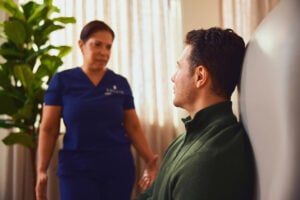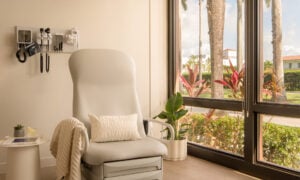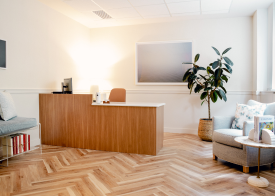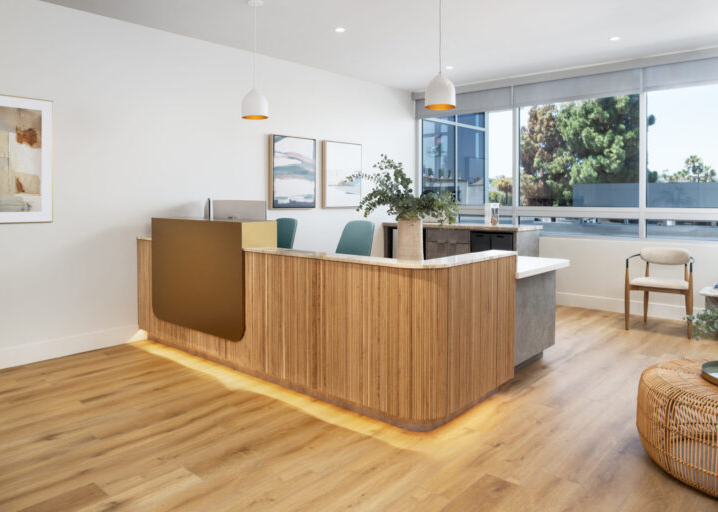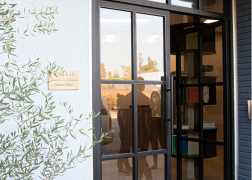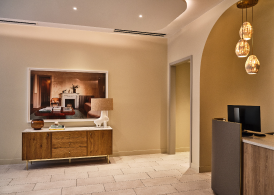How and when were you diagnosed with Graves’ disease?
About 11 or 12 years ago, I was deep into my fertility journey, and one of the doctors I saw—after a full blood workup—told me I had Graves’ disease. I had no idea. I’d never even heard of it and was completely unfamiliar with the symptoms, many of which I had, like night sweats, weight loss, accelerated heart rate. It was subtle, but I was aware my body and how I felt in my body had been changing. And this particular doctor was the first (after seeing so many!) who told me it was very likely playing a factor in my inability to carry a pregnancy full term (I think I had had about three or four miscarriages at that point). I found a wonderful endocrinologist, and because the treatment for Graves’ was, at the time, pretty intense, I had to choose a course that wouldn’t complicate my ability to have a child in the near future. It was complicated. And stressful, especially because it was so hard to find current, progressive info about Graves’. There was so much literature and data available for the opposite thyroid condition, Hypo-thyroidism or Hashimoto’s disease, but not much for Graves’. The other thing is, like so many other auto-immune disorders, it’s mysterious. I had read somewhere that it could be triggered by a traumatic or stressful event, and I could trace my weight loss back to something significant that happened. I just didn’t know the two were related to my thyroid. It was illuminating.
What kind of an impact has it had on your life, emotionally and physically?
I’ve been in remission for about six years now. And like anyone who’s had a chronic illness, I have anxiety every time I go to the doctor for a checkup, waiting to see where my TSH levels are. Stress and anxiety are intertwined with Graves’. I was a nervous child, so it’s interesting that this might be a health challenge I would have to overcome.
“If your thyroid is off, you can literally feel it in your body, your mood, your thoughts. It complicated everything. I had numerous miscarriages. I couldn't sleep, I wasn't hungry, and I kept losing weight.”
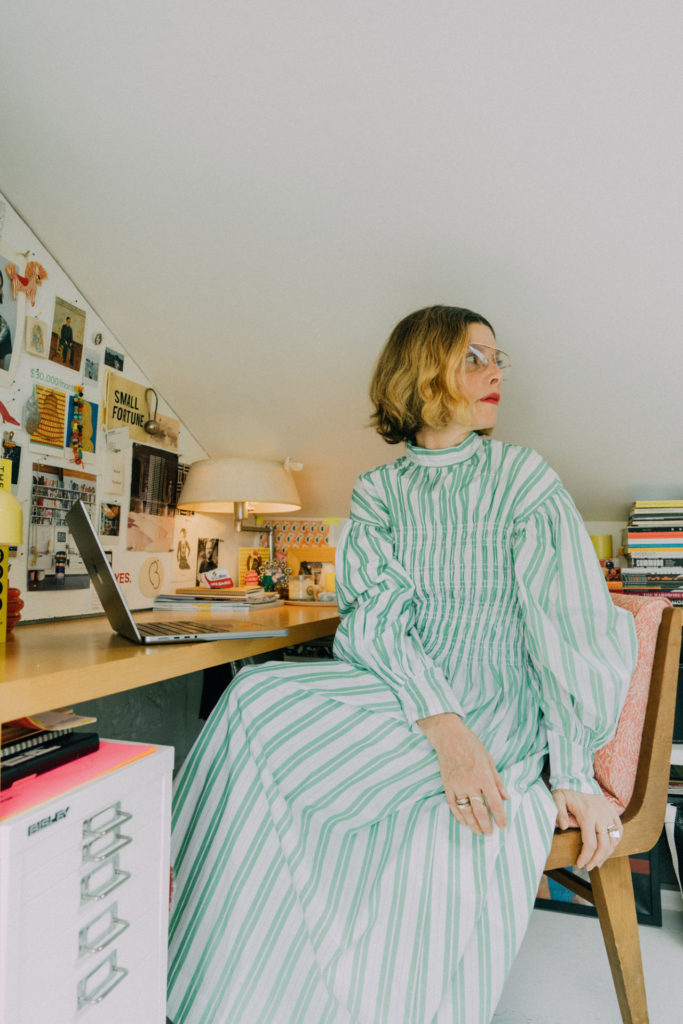
What sort of treatments have you tried, and what’s been the most effective? Is there anything holistic you’d recommend?
It was a nutritionist who first told me to give up gluten immediately. So, I can’t be sure if that was directly related to my remission, but I believe it was, along with a low dose of medication. Giving up gluten was a huge game-changer for me. I don’t have an allergy and eat it occasionally now, but I really try to avoid it since I think my body was more at ease without it.
Were there ever times you didn’t feel seen or heard by your doctors, or worse, times when you felt like they were gaslighting you? Anything they didn’t tell you that you wish they had?
I mean, that’s essentially the fertility industry, which can feel incredibly impersonal and isolating during some of the most complicated, confusing, and devastating experiences a family can have. I really wondered why after spending thousands and thousands of dollars it took a third doctor to notice I had Graves’. It’s possible it wasn’t showing up before, but my symptoms were pretty obvious. I’ve also learned how closely connected thyroid health is with fertility… so why not have that conversation up front? One of the most sobering moments was when I met the first endocrinologist recommended to me, and after our initial exam he told me flat-out I should have my thyroid removed. No treatment, just remove it. I was like, “Whoa… doesn’t that seem extreme?” And he very flatly told me if I wanted to have a baby as soon as possible, this was the best course of action, not considering I would have to deal with that choice for the rest of my life. I cried a lot over that, and it was so scary going against his recommendation. But I knew it wasn’t the right choice for me. At that point I hadn’t even tried to correct my thyroid function, and I needed to see if I could do it by taking less extreme measures.
Was it difficult hearing more about Hashimoto’s—and why do you think people are less vocal about Graves’?
That’s a great question. Honestly, from the start I remember having tremendous sensitivity for anyone dealing with thyroid issues… because it’s subtle and it really has an impact on so many systems in our bodies. If your thyroid is off, you can literally feel it in your body, your mood, your thoughts. I’m not sure why no one shares as much about Graves’. I was hard-pressed to even find a community group connecting Graves’ and fertility. Just finding one other person on that journey with me would have been so incredible.
Did having Graves’ complicate your efforts to have a baby? What kind of psychological toll did that take on you?
It did… it complicated everything. I had numerous miscarriages. I couldn’t sleep, I wasn’t hungry, and I kept losing weight. It was like drinking coffee all day long: wired, constantly. I started reading a blog by a woman in recovery from Graves’, and she was honest about how much she missed it sometimes. She missed being hyper productive and needing so much less sleep than she did post-remission. Reading that made me smile, because it revealed you can have a sort of kindness for our conditions. Maybe sometimes health complications or crises show up to teach us about other things other than how our bodies are working. Dealing with my Graves’ helped me to deal with my anxiety… about everything. It’s only in retrospect that I can see and feel that.
“When I met the first endocrinologist recommended to me, he told me flat-out I should have my thyroid removed. No treatment, just remove it. I was like, ‘Whoa… doesn't that seem extreme?’ It was so scary going against his recommendation, but I knew it wasn't the right choice for me.”
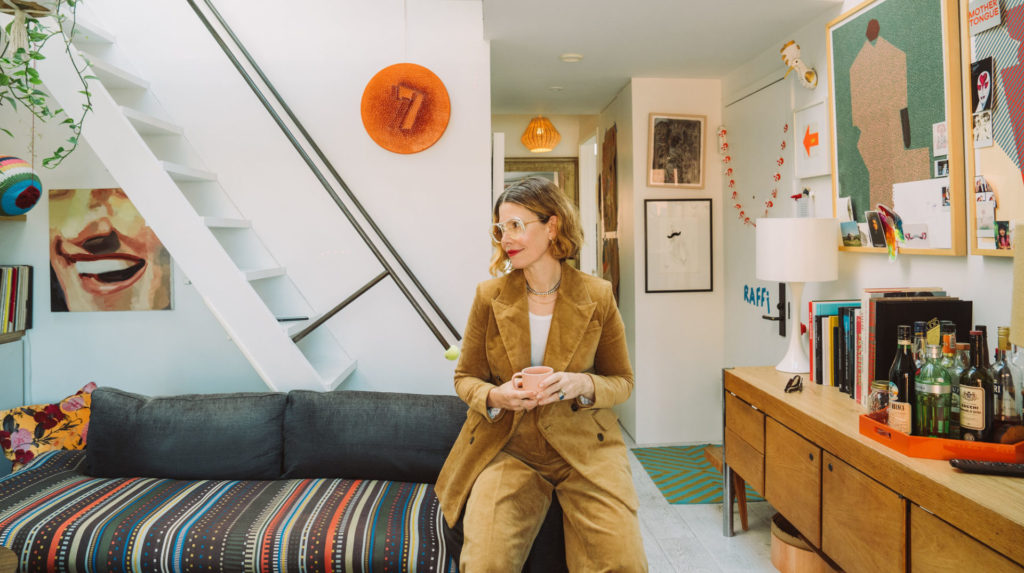
How have you been able to advocate for yourself in a medical system that has little patience for chronic illness?
I try to really meditate on not being scared now going in for routine exams. I’m not sure a lot of people in the flow of a medical practice really know or notice how emotional and frightening it can be, even for people who are conceivably healthy or fine. How much courage it takes, especially if you’ve been through a crisis. I remember once during a first sonogram for an early-stage pregnancy, the person who was conducting it couldn’t find the heartbeat. It wasn’t there, we all knew it. Without saying a word, I could see how devastated she was for me and my partner. She left the room and I felt really numb. And then I heard the radiologist/doctor—who she was sharing the news with—shout to his colleague something like, “Just mark down the cause as AMA.” Which means “advanced maternal age.” There I was, still in the stirrups, the door slightly ajar, and both my husband and I heard him shout it, not really knowing if that was the cause or not. Not to mention, it didn’t even occur to him that I might be upset or vulnerable. That experience really affected me. And I know from that experience that so many people deal with treatment that is so much worse and can be incredibly destructive. It shouldn’t be that way. Holding space for people in that kind of environment is so critical… to everything. Least of all your state of mind for recovery.
Given all the specialists you’ve had to see over the years, how would being a member of Sollis have made your experience a little easier—and in what ways will it make it smoother for you going forward?
When you’re going through a complex health-related event/experience, navigating what seems like endless appointments, results, and referrals can literally be like another full-time job. So, having extra support and access to a service that can do a lot of that coordinating and time-intensive legwork for you/with you, can be truly game-changing.
What advice do you have for someone who’s suffering from Graves’—or any sort of chronic illness—and feeling isolated or having trouble getting the right help?
Find a doctor that comes highly recommended from someone you trust. That relationship is really important. My general care practitioner took a leave of absence from her practice a few years ago and I can see how important her care and work has been for me. I miss her so much. I had to have a biopsy following a mammogram that showed calcifications, and she literally talked me through every step, even holding space for me to explore what might happen if the news wasn’t good. It was like she was a family member, she seemed to care that much. And it made a huge difference. I understand it’s not a job for healthcare providers to be like family members, but knowing that many people need warmth and kindness in those very questionable moments goes a very long way to building trust… and coming out the other side.

